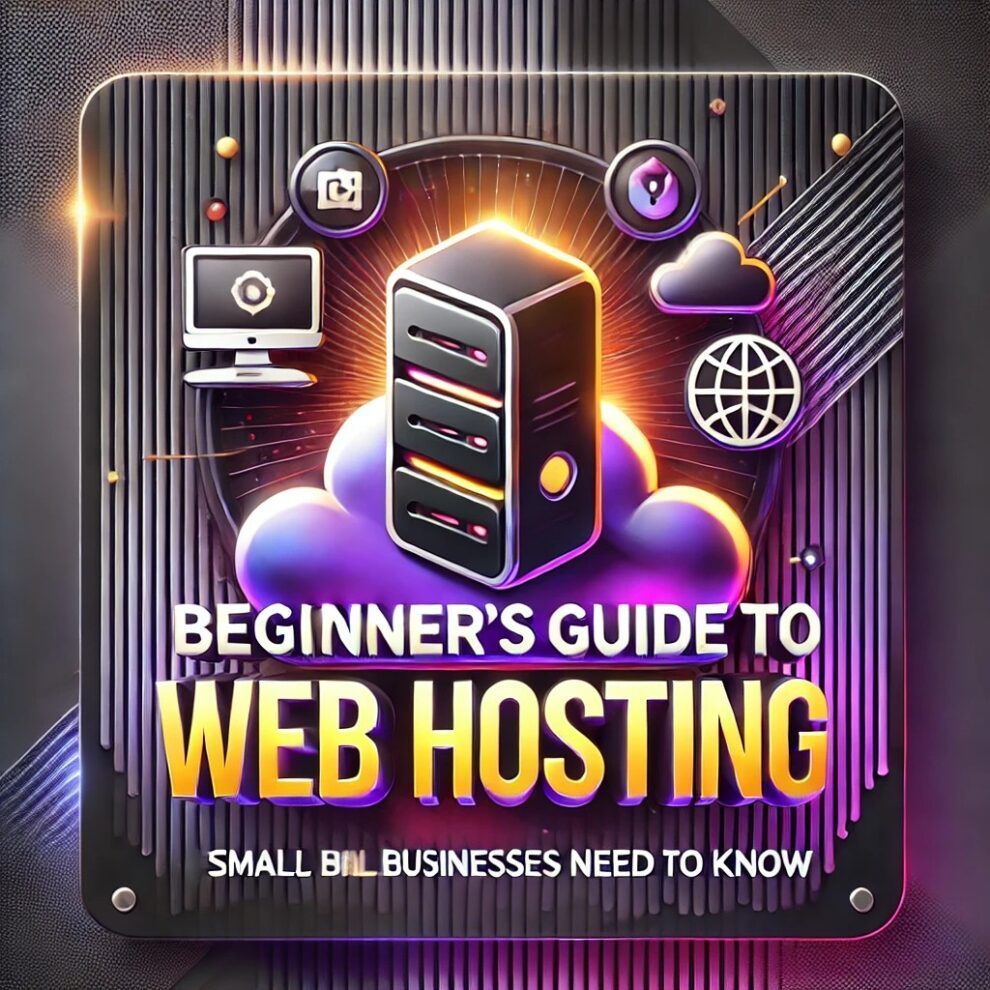So, you’ve decided to launch a website. You might be a start-up, a small business owner, a large company, a not-for-profit, or a government department. Congratulations on entering the digital jungle! Before your masterpiece can dazzle the world, it needs a place to live.
Enter the world of web hosting, where your website’s data finds a cozy corner on a web server. Let’s demystify this essential yet perplexing aspect of the internet.
What Is Web Hosting?
Imagine renting a tiny apartment for all your website’s files and data. That’s web hosting. You pay a hosting company to store your site’s web pages information on their server, making it accessible to anyone with an internet connection on the world wide web
These web hosting providers offer various web hosting plans, products, and services depending on your business type. Hosting providers handle the gritty details of keeping servers running, implementing security measures, and ensuring your data is transferred smoothly to visitors’ browsers.
How Does Web Hosting Work?
Picture this: Your website is hosted on a physical server managed by web hosts, a high-powered computer that runs 24/7. When someone types your domain name into their browser, the hosting server springs into action, sending all the files needed to display your site. You could host your website yourself, but unless you have a PhD in IT, it’s best left to the pros. Self-hosting means buying and maintaining your server – an endeavor that requires both technical skills and a tolerance for endless troubleshooting.
Let’s break down the process:
Domain Name Entry: When a user types your website’s domain name (like www.techwizardnews.com) into their browser, it sends a request over the internet to the server that hosts your site.
Server Response: The hosting server, which is basically a super-powered computer, receives the request and responds by sending the required files (like HTML, CSS, and images) back to the user’s browser.
Website Display: The browser assembles these files into a coherent web page that users can interact with. All this happens in a matter of seconds.
Types of Web Hosting Services
With web hosting, it’s all about finding the right fit. Here’s a rundown of the most common types:
Shared Hosting: The backpacker hostel of web hosting. You share server resources with other websites, making it affordable and perfect for beginners. Think of it as renting a bed in a shared dorm room. Great for small businesses and personal blogs, but be warned – if your neighbor’s site gets popular, your speed might take a hit.
Pros:
Cost-effective: It’s the cheapest option, perfect for small-scale websites and beginners.
No Technical Expertise Required: It’s user-friendly with pre-configured server options.
Maintenance-Free: The host takes care of server maintenance and administration.
Cons:
Limited Resources: Sharing resources means your website’s performance can suffer if others on the same server experience high traffic.
Limited Control: Minimal access to server configurations.
Virtual Private Server (VPS) Hosting: A step up from shared hosting. You still share a server, but with allocated resources just for you. It’s like moving from a hostel to a shared apartment – more privacy and stability, but you’ll need some know-how to manage it. Virtual private servers (VPS) are ideal for medium-sized sites and growing eCommerce shops. Web hosting service providers like Conetix should be able to help you find a VPS solution to suit you. They also have great technical support.
Pros:
Dedicated Resources: Each user gets their own portion of server resources, ensuring better performance.
Greater Control: Root access allows for custom configurations.
Scalability: Easily upgradeable as your site grows.
Cons:
Requires Technical Knowledge: Managing a VPS requires some server management skills.
Higher Cost: More expensive than shared hosting, and you might need to hire a developer.
Cloud Hosting: The penthouse suite. Your business website (consisting of your website files) are hosted on a cluster of web server(s), so if one server goes down, another takes over. Perfect for business owners needing high reliability and scalability. Just like living in a cloud, it’s more expensive but worth it for the uptime and peace of mind.
Pros:
High Reliability: Reduced likelihood of downtime and hardware failure.
Scalability: Resources can be scaled up or down based on demand.
Load Balancing: Manages high traffic efficiently.
Multiple Websites: Cloud hosting can effectively manage high traffic across multiple websites, ensuring minimal downtime.
Cons:
Cost: More expensive than VPS and shared hosting.
Limited Control: Root access is not always provided.
WordPress Hosting: Tailored specifically for WordPress sites, this option comes with pre-installed themes and plugins to make your life easier. It’s like having a butler who knows exactly how you like your tea. Great for beginners and WordPress aficionados.
Pros:
Optimized Performance: Servers are configured for optimal WordPress performance.
Beginner-Friendly: Comes with pre-installed WordPress and necessary plugins.
Specialized Support: Customer support trained in WordPress issues.
Cons:
Limited Flexibility: Not suitable for non-WordPress websites.
Dedicated Hosting: The mansion of web hosting. You get an entire server to yourself, with all the customization options you could dream of. It’s powerful, reliable, and expensive – suited for large businesses with high traffic and specific needs.
Pros:
Complete Control: Full root access and control over the server’s configuration.
High Performance: No sharing of resources with other sites.
Reliability: High uptime and security measures.
Dedicated Server: A dedicated server offers improved security and performance compared to shared hosting.
Cons:
Costly: The most expensive hosting option.
Technical Expertise Needed: Requires knowledge in server management.
How to Choose the Best Web Hosting Service Provider?
Choosing a web hosting service provider is like picking a roommate – compatibility is key. You should consider different hosting packages whether it’s for business websites or personal websites. Here’s what to consider:
Control Panel: Look for a user-friendly interface. You don’t want to navigate a labyrinth every time you need to manage your site. Options like cPanel or Plesk make life easier, but some hosts offer their own panels tailored for simplicity.
Uptime: The closer to 100%, the better. Downtime means lost visitors and potential revenue. Most reputable hosts offer at least a 99.9% uptime guarantee but read the fine print.
Technical Specifications: Ensure the host offers enough storage, bandwidth, and processing power for your needs. For instance, if you’re running a high-traffic blog or an eCommerce site, you’ll need more robust resources.
Online Reviews: See what others have to say. If the reviews are glowing, it’s a good sign. Sites like Trustpilot and G2 provide user-generated reviews that can offer insights into real customer experiences.
Security: Advanced security measures are a must to protect your site from threats. Look for features like SSL certificates, DDoS protection, automated backups, and malware scanning.
24/7 Customer Support: Because issues don’t keep office hours. Support should be available around the clock via multiple channels – chat, email, and phone. Check if they also provide support resources such as tutorials and knowledge bases.
Additional Services: Extras like SSL certificates, business email accounts, and content delivery networks (CDNs) add value. Some hosts also offer SEO tools, site builders, and marketing credits.
What’s the Difference Between Web Hosting and a Domain Name?
Think of web hosting as your site’s home and the domain name as its address. You need both to get visitors to your site. Domains are usually easy to get – just like finding a new trendy suburb to live in – but hosting is where the real decisions come in.
A domain name usually consists of a website name and a domain extension such as .com, .org, or .net. Also, there are lots of other options and new domain names like .xyz, which are among the most popular alternatives today.
A domain and a hosting account can be purchased from the same or different providers. Many hosting companies offer domain registration as well.
To get started, decide on a domain name and check its availability.
Domain Name Checker: Instantly check domain name availability. Enter your desired domain name. Once you find a unique domain name, register it with a domain registrar. If it’s not the same company you chose for hosting the site, buy a hosting plan and point the domain name accordingly.
Alternatively, buying a hosting plan that includes free domain name registration is a much simpler and more affordable solution. However, if you are not happy with the service provided, you can migrate the site to a new host. Just make sure that the company supports your website’s framework.
Choosing an Australian Web Host
Now, let’s add some local flavor. If you’re looking to host your site Down Under, there are several reputable Australian web hosting companies to consider:
Conetix: A stellar performer in customer service, breadth of products, and quality of hosting. You will always get a local customer service operator to help you out. Great technical support. Australian-owned and operated. They also support several “tier one” clients in government and corporate, and have a comprehensive list of offerings including managed wordpress hosting, wordpress hosting, email hosting, business web hosting, and virtual private servers (VPS).
VentraIP: Known for its great customer service and reliable uptime, VentraIP offers a range of hosting plans suitable for everything from small blogs to large eCommerce sites. Plus, they’re proudly Australian-owned and operated.
Digital Pacific: With a focus on sustainability, Digital Pacific offers eco-friendly hosting solutions. They provide excellent performance and customer support, making them a solid choice for Aussie businesses.
Crucial: Specializing in cloud hosting, Crucial offers scalable solutions perfect for growing businesses. Their data centers are located in Sydney, ensuring fast loading times for Australian visitors.
Netregistry: One of the largest web hosting companies in Australia, Netregistry offers a wide range of services, including domain registration, web hosting, and digital marketing solutions. Their comprehensive support and extensive resources make them a top choice.
Conclusion
Building a website involves a lot of choices, and web hosting is one of the big ones. Whether you’re a small business, a blogger, or launching an online store, the right hosting plan is crucial. Learn the basics, consider your needs, and don’t be afraid to upgrade as your site grows. With the right web host, your site will be ready to take on the world – or at least the internet.
Remember, choosing a web hosting provider is like picking a partner for a long-term relationship. You want reliability, support, and the ability to grow together. Do your research, read reviews, and consider your specific needs. And if you’re hosting in Australia, take advantage of local companies that understand the unique demands of the market.
Web Hosting FAQs
Is It Necessary to Buy Hosting?
Most often, yes. Going with a web hosting company is the most convenient and cost-effective approach to hosting a website.
Top hosts also implement advanced technologies to keep your site safe and secure. However, if you start a blog using WordPress.com, you don’t need to buy a hosting plan.
Can I Host My Website for Free? How Does Free Web Hosting Work?
Hosting your website for free is possible, but it has its limits.
Paid plans are easier to customize and have larger bandwidth, storage, and processing power. Free plans don’t offer additional features to improve your website’s speed or security either.
How Much Does It Cost to Host a Website?
The total cost of hosting a website varies depending on the provider, the type of hosting, and the desired features you choose.
You might want to prioritize fast web page loading over price. Maybe you want the most budget-friendly option? Maybe you want a content management system or a website builder like Elementor? Maybe you want to try a provider that offers free web hosting… If you are looking for affordable, beginner-friendly options, consider shared and WordPress hosting plans from Conetix.
Whatever you are after there’s a web hosting solution for you.
Other articles which you may find interesting:
Disclaimer: As an affiliate partner to various brands I may earn from qualifying purchases for the following businesses: A2 Hosting, Amazon Associates, Bluehost, Conetix, Crazy Domains, Digital Ocean, Hostgator. This means that if you click on an affiliate link and make a purchase, I may receive a small commission at no additional cost to you. I only recommend products that I genuinely believe will add value to my readers.


















Recent Comments